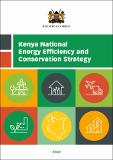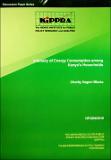| dc.date.accessioned | 2023-02-22T08:54:07Z | |
| dc.date.available | 2023-02-22T08:54:07Z | |
| dc.date.issued | 2007 | |
| dc.identifier.uri | https://repository.kippra.or.ke/handle/123456789/4074 | |
| dc.description.abstract | There is a close relationship between economic growth and quality of life, on one hand, and
demand for energy, on the other. Acountry cannot experience high levels of economic growth if
energy supplies are constrained. Lack of adequate and reliable supply of energy reduces
the potential for achieving major structural changes in rural and urban economies. There is also
the critical relationship between energy and the environment. The environment provides raw
materials for the energy industry. The environment, on the other hand, is the recipient of the
residues of energy production and consumption, and fossil fuels are the largest contributors
to air pollution. The emissions, especially carbon dioxide, methane, nitrogen and sulphur
oxides are responsible for changes in the atmosphere that are affecting the global climate. | en |
| dc.language.iso | en | en |
| dc.publisher | The Kenya Institute for Public Policy Research and Analysis (KIPPRA) | en |
| dc.relation.ispartofseries | Policy Brief;No. 08 of 2007 | |
| dc.subject | Energy Supply | en |
| dc.subject | Petroleum Products | en |
| dc.subject | Modern Energy Services | en |
| dc.subject | Crude Oil Prices | en |
| dc.subject | Alternative Energy Sources | en |
| dc.title | Policy Brief No. 08 of 2007 on Strategies for Securing Energy Supply in Kenya | en |
| dc.type | Other | en |
| ppr.contributor.author | The Kenya Institute for Public Policy Research and Analysis (KIPPRA) | en |




